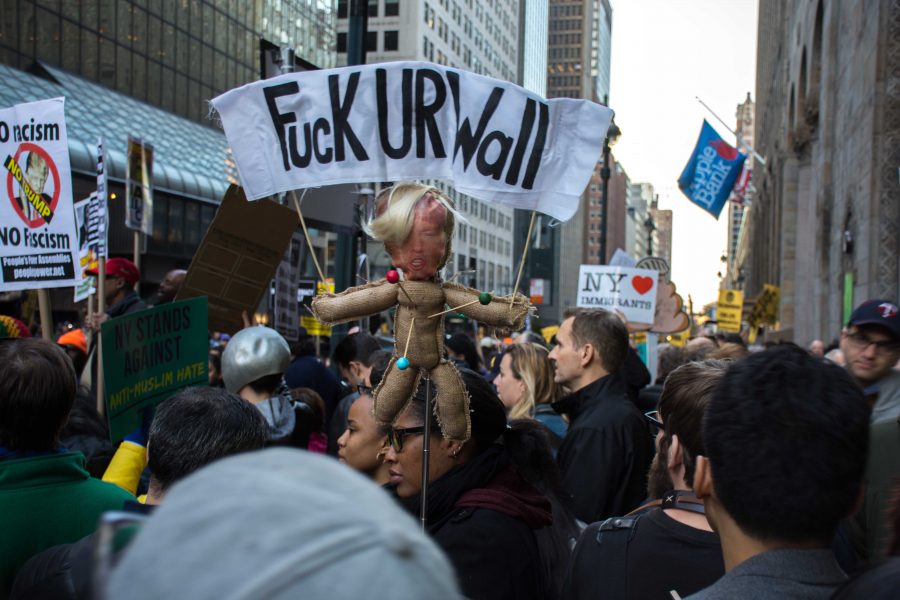“Trumphobia”
COD students fear Trump’s plan to cancel DACA
December 6, 2016
Maria Gonzalez (not her real name) is a student here at the College of DuPage. She has been in the United States since she was a toddler, and her memory can only recount life a child in America. Years ago, her parents waited until she was 16 to let her know she wasn’t a legal U.S. citizen. This happened when her parents were about to finalize her Deferred Action for Childhood Arrivals (DACA) papers. Her parents withheld information about her status in the U.S. as a way to prevent her from living with fear like her older siblings.
DACA is “an immigration policy that allows certain undocumented immigrants who entered the country as minors to receive a renewable two-year period of deferred action from deportation and eligibility for a work permit.”
Throughout his campaign, president-elect Donald Trump vowed to cancel this plan leaving thousands of young adults living with the fear of being deported. Like Gonzalez, many students here at the COD are no longer contemplating the toughness of the pending final exams, rather they are eagerly waiting for Trump’s decision when he takes office in January.
DACA has been a beacon of hope to a student like Gonzalez. In fact, she has been able to address her needs by getting a work permit and a driver’s license all because of DACA.
“All I’d ever wanted was to drive, and when the DACA was in order I could finally feel independent,” said Gonzalez. “Without it, I would not be able to make a living for myself and have opportunities that I do now. You don’t realize how important driving and working are to being a regular person until you legally aren’t allowed to do so.”
Trump has planned to deport illegal immigrants and carry out an extreme vetting to allow any re-entry. When Trump met with Kris Kobach, Kansas’ Secretary of State and a part of Trump’s immigration policy transition team, Kobach inadvertently leaked documents outlining a very strong view about immigration that Trump has also suggested he will support. Gonzalez’ fear won’t end until Trump leaves the White House.
“As soon as Trump got elected, I had a constant weight on my heart for a few days,” continued Gonzalez. “Imagine living in a country where you have established yourself and have made friendships and memories, and now being afraid that you might have to leave and start a life somewhere where even though you were born, you have no idea of the culture or the values. It’s scary. But I’ve been seeing things that say that Trump will only be trying to get rid of those who have a criminal history, so I have hope that I’ll be okay.”
Gonzalez isn’t the only person living with this fear. A professor recently reached out to the Courier and told us about a student who expressed a similar feeling like Gonzalez. When the Courier reached out to her, she replied through the professor saying, “I don’t want to talk about this anymore.”
COD currently welcomes students who were granted privileges under DACA. Students on this status must fill out an appeal form to avoid paying an international rate. They are ineligible for federal grants and aid. The college thereby provides links to external scholarship opportunities for these students on its website.
But as a public college, the termination of DACA will lead to a decision that follows the federal law. The college has been under federal investigation in the past, and going back this route isn’t an option especially when all is being done to settle the accreditation problem.
“I want to assure you that College of DuPage is committed to serving all our students in a manner consistent with what the law permits,” said Ann Rondeau, president of COD.
All efforts to get the number of students attending COD who are beneficiaries of DACA failed to receive a response. However, the college has hosted roundtables and sessions aimed at reducing the fear and divisiveness some students are experiencing.
The Latino Ethnic Awareness Association (LEAA), an umbrella club that unites Latino students, alerts students about updates on immigration policies. Events organized by the college to help talk about immigration issues are poorly attended despite widespread publicity. Recently, Rocio Becerril, an attorney who deals with immigration issues, was on campus to talk about current trends with regards to the complexities surrounding America’s immigration laws. The college, through LEAA, is doing whatever possible to meet the needs of these students.
“As a club, LEAA welcomes all students regardless of immigration status,” said Saraliz Jimenez, LEAA’s faculty advisor. “Many students choose not to disclose their status so we don’t know if a student is DACA or not unless they self-disclose. I am the manager of the Latino Outreach Center, and I try to stay on top of any changes occurring in the community or at the national level that affects these students.”
Living around Chicago gives hope to DACA recipients. Recently, Chicago Mayor Rahm Emmanuel announced Chicago will remain a “sanctuary city” for undocumented residents and budgeted $1 million to facilitate legal fees expected to be incurred by undocumented residents.
According to Emmanuel’s plan, “the fund will provide immediate legal information, screenings, consultations and representation to individuals who may be at risk for deportation.”
Unlike Emmanuel, mayors of suburban cities where COD students live are yet to say anything about a plan that will debunk a feared cancellation of DACA.


















